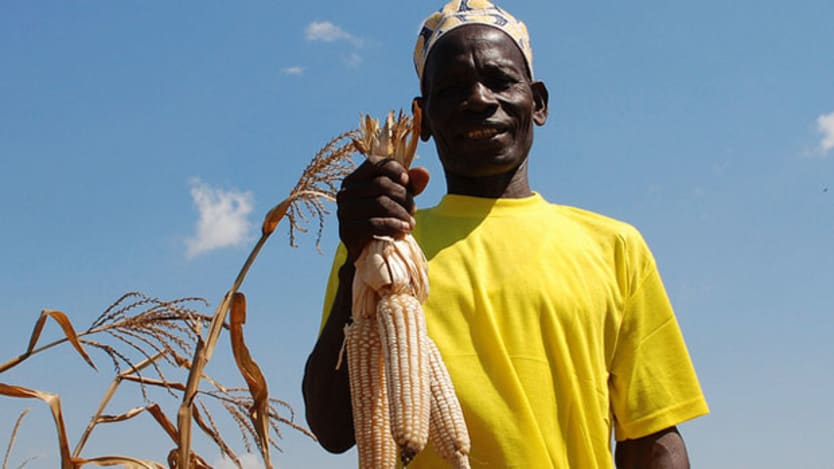
Across much of sub-Saharan Africa, where maize is the most common staple crop, production is almost completely rainfed, making farmers highly susceptible to extreme weather events, such as drought.
Drought conditions damage about 40 percent of all maize crops, endangering the livelihoods and food security of millions of smallholder farmers.
Enter drought-tolerant maize.
Drought-tolerant maize has been bred, typically through traditional methods, to have a built-in tolerance to water shortages. While there is ongoing research to test the performance of genetically modified maize varieties, the varieties currently available to farmers are not genetically modified.
“If widely adopted, drought-tolerant maize could help African farmers cope with extended periods of drought, thereby improving yields, livelihoods and the food security of tens of millions of farmers,” said John McMurdy, international research and biotechnology adviser at the U.S. Agency for International Development’s Bureau for Food Security.
After decades of work on maize improvement projects, USAID recently made a bigger commitment to researching, supporting and getting drought-tolerant maize into the hands of smallholder farmers through its newly launched U.S. Global Development Lab. To date — and with substantial support from the Bill & Melinda Gates Foundation — drought-tolerant varieties have been delivered to 3 million farmers across Africa.
The goal is to have an additional 4 million smallholder farmer households adopt drought-tolerant maize seeds within 18 months, and the agency is looking to the private sector and other partners for help.
“Drought-tolerant maize is an already proven technology,” Andrew Levin, Center for Global Solutions sector team lead in the U.S. Global Development Lab at USAID, told Devex. “This is something that has demonstrated impact and the potential to scale more broadly.”
Today, there are more than 150 varieties of drought tolerant maize that match or exceed the yields of commercial seed with average rainfall, and yield up to 30 percent more under moderate drought conditions. USAID has helped develop some of these new varieties — including more than 50 during the past five years through programs such as Drought Tolerant Maize for Africa and Water Efficient Maize for Africa.
Yet drought-tolerant maize still has its limitations.
“In cases of severe drought, these varieties act no different from traditional maize, and they die just the same,” McMurdy said. “Marrying the deployment of drought-tolerant maize with something like a crop insurance product against catastrophic weather could go a long way to further reduce risks and increase grain harvests for farmers.”
One of the major benefits of drought tolerant-maize is that it reduces risks for farmers — allowing for more consistent crop production in the face of varied weather patterns. That leads to greater household food security and production increases, which enable farmers “to allocate their land to higher value crops with better economic returns,” according to Levin.
More stable maize production helps not just the farmers, but also actors throughout the value chain — including millers, processors and traders — who benefit from having a more dependable supply.
The U.S. Global Development Lab is bringing together more organizations than ever before to work on this issue — from traditional research centers and development programs to multinational corporations and small entrepreneurs. The team is looking to draw expertise from the private sector to provide needed logistical, supply chain, distribution and marketing expertise to help disseminate seeds to small and medium seed companies, and ultimately to smallholder farmers.
“It’s a new way of working for us,” said Levin. “We’re asking the right questions and pulling the right partners together, which is really the only way we’re going to be able to achieve broad impact.”
Join Devex, the largest online community for international development, to network with peers, discover talent and forge new partnerships — it’s free. Then sign up for the Devex Impact newsletter to receive cutting-edge news and analysis every month on the intersection of business and development.
Search for articles
Most Read
- 1
- 2
- 3
- 4
- 5








